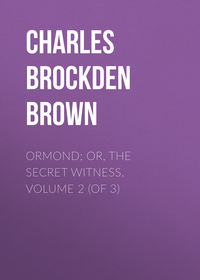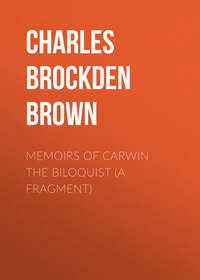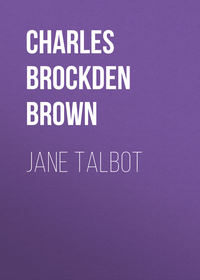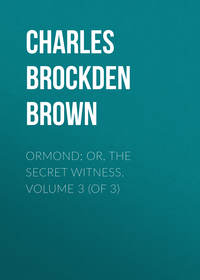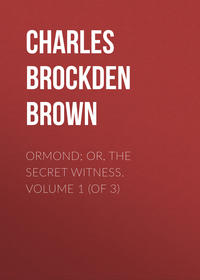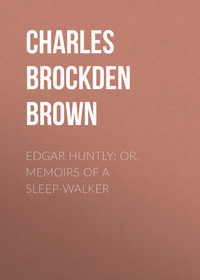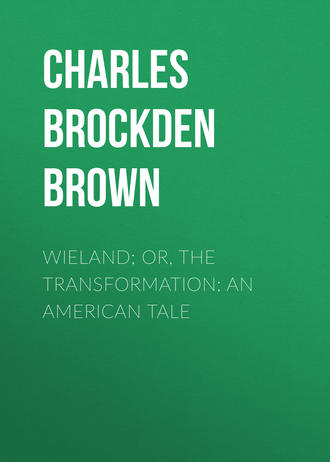 полная версия
полная версияWieland; Or, The Transformation: An American Tale
"Towards his house I immediately turned my horse's head. He produced the paper, but I found nothing more than had already been seen. While busy in perusing it, the printer stood by my side. He noticed the object of which I was in search. "Aye," said he, "that is a strange affair. I should never have met with it, had not Mr. Hallet sent to me the paper, with a particular request to republish that advertisement."
"Mr. Hallet! What reasons could he have for making this request? Had the paper sent to him been accompanied by any information respecting the convict? Had he personal or extraordinary reasons for desiring its republication? This was to be known only in one way. I speeded to his house. In answer to my interrogations, he told me that Ludloe had formerly been in America, and that during his residence in this city, considerable intercourse had taken place between them. Hence a confidence arose, which has since been kept alive by occasional letters. He had lately received a letter from him, enclosing the newspaper from which this extract had been made. He put it into my hands, and pointed out the passages which related to Carwin.
"Ludloe confirms the facts of his conviction and escape; and adds, that he had reason to believe him to have embarked for America. He describes him in general terms, as the most incomprehensible and formidable among men; as engaged in schemes, reasonably suspected to be, in the highest degree, criminal, but such as no human intelligence is able to unravel: that his ends are pursued by means which leave it in doubt whether he be not in league with some infernal spirit: that his crimes have hitherto been perpetrated with the aid of some unknown but desperate accomplices: that he wages a perpetual war against the happiness of mankind, and sets his engines of destruction at work against every object that presents itself.
"This is the substance of the letter. Hallet expressed some surprize at the curiosity which was manifested by me on this occasion. I was too much absorbed by the ideas suggested by this letter, to pay attention to his remarks. I shuddered with the apprehension of the evil to which our indiscreet familiarity with this man had probably exposed us. I burnt with impatience to see you, and to do what in me lay to avert the calamity which threatened us. It was already five o'clock. Night was hastening, and there was no time to be lost. On leaving Mr. Hallet's house, who should meet me in the street, but Bertrand, the servant whom I left in Germany. His appearance and accoutrements bespoke him to have just alighted from a toilsome and long journey. I was not wholly without expectation of seeing him about this time, but no one was then more distant from my thoughts. You know what reasons I have for anxiety respecting scenes with which this man was conversant. Carwin was for a moment forgotten. In answer to my vehement inquiries, Bertrand produced a copious packet. I shall not at present mention its contents, nor the measures which they obliged me to adopt. I bestowed a brief perusal on these papers, and having given some directions to Bertrand, resumed my purpose with regard to you. My horse I was obliged to resign to my servant, he being charged with a commission that required speed. The clock had struck ten, and Mettingen was five miles distant. I was to Journey thither on foot. These circumstances only added to my expedition.
"As I passed swiftly along, I reviewed all the incidents accompanying the appearance and deportment of that man among us. Late events have been inexplicable and mysterious beyond any of which I have either read or heard. These events were coeval with Carwin's introduction. I am unable to explain their origin and mutual dependance; but I do not, on that account, believe them to have a supernatural origin. Is not this man the agent? Some of them seem to be propitious; but what should I think of those threats of assassination with which you were lately alarmed? Bloodshed is the trade, and horror is the element of this man. The process by which the sympathies of nature are extinguished in our hearts, by which evil is made our good, and by which we are made susceptible of no activity but in the infliction, and no joy but in the spectacle of woes, is an obvious process. As to an alliance with evil geniuses, the power and the malice of daemons have been a thousand times exemplified in human beings. There are no devils but those which are begotten upon selfishness, and reared by cunning.
"Now, indeed, the scene was changed. It was not his secret poniard that I dreaded. It was only the success of his efforts to make you a confederate in your own destruction, to make your will the instrument by which he might bereave you of liberty and honor.
"I took, as usual, the path through your brother's ground. I ranged with celerity and silence along the bank. I approached the fence, which divides Wieland's estate from yours. The recess in the bank being near this line, it being necessary for me to pass near it, my mind being tainted with inveterate suspicions concerning you; suspicions which were indebted for their strength to incidents connected with this spot; what wonder that it seized upon my thoughts! "I leaped on the fence; but before I descended on the opposite side, I paused to survey the scene. Leaves dropping with dew, and glistening in the moon's rays, with no moving object to molest the deep repose, filled me with security and hope. I left the station at length, and tended forward. You were probably at rest. How should I communicate without alarming you, the intelligence of my arrival? An immediate interview was to be procured. I could not bear to think that a minute should be lost by remissness or hesitation. Should I knock at the door? or should I stand under your chamber windows, which I perceived to be open, and awaken you by my calls?
"These reflections employed me, as I passed opposite to the summer-house. I had scarcely gone by, when my ear caught a sound unusual at this time and place. It was almost too faint and too transient to allow me a distinct perception of it. I stopped to listen; presently it was heard again, and now it was somewhat in a louder key. It was laughter; and unquestionably produced by a female voice. That voice was familiar to my senses. It was yours.
"Whence it came, I was at first at a loss to conjecture; but this uncertainty vanished when it was heard the third time. I threw back my eyes towards the recess. Every other organ and limb was useless to me. I did not reason on the subject. I did not, in a direct manner, draw my conclusions from the hour, the place, the hilarity which this sound betokened, and the circumstance of having a companion, which it no less incontestably proved. In an instant, as it were, my heart was invaded with cold, and the pulses of life at a stand.
"Why should I go further? Why should I return? Should I not hurry to a distance from a sound, which, though formerly so sweet and delectable, was now more hideous than the shrieks of owls?
"I had no time to yield to this impulse. The thought of approaching and listening occurred to me. I had no doubt of which I was conscious. Yet my certainty was capable of increase. I was likewise stimulated by a sentiment that partook of rage. I was governed by an half-formed and tempestuous resolution to break in upon your interview, and strike you dead with my upbraiding.
"I approached with the utmost caution. When I reached the edge of the bank immediately above the summer-house, I thought I heard voices from below, as busy in conversation. The steps in the rock are clear of bushy impediments. They allowed me to descend into a cavity beside the building without being detected. Thus to lie in wait could only be justified by the momentousness of the occasion."
Here Pleyel paused in his narrative, and fixed his eyes upon me. Situated as I was, my horror and astonishment at this tale gave way to compassion for the anguish which the countenance of my friend betrayed. I reflected on his force of understanding. I reflected on the powers of my enemy. I could easily divine the substance of the conversation that was overheard. Carwin had constructed his plot in a manner suited to the characters of those whom he had selected for his victims. I saw that the convictions of Pleyel were immutable. I forbore to struggle against the storm, because I saw that all struggles would be fruitless. I was calm; but my calmness was the torpor of despair, and not the tranquillity of fortitude. It was calmness invincible by any thing that his grief and his fury could suggest to Pleyel. He resumed—
"Woman! wilt thou hear me further? Shall I go on to repeat the conversation? Is it shame that makes thee tongue-tied? Shall I go on? or art thou satisfied with what has been already said?"
I bowed my head. "Go on," said I. "I make not this request in the hope of undeceiving you. I shall no longer contend with my own weakness. The storm is let loose, and I shall peaceably submit to be driven by its fury. But go on. This conference will end only with affording me a clearer foresight of my destiny; but that will be some satisfaction, and I will not part without it."
Why, on hearing these words, did Pleyel hesitate? Did some unlooked-for doubt insinuate itself into his mind? Was his belief suddenly shaken by my looks, or my words, or by some newly recollected circumstance? Whencesoever it arose, it could not endure the test of deliberation. In a few minutes the flame of resentment was again lighted up in his bosom. He proceeded with his accustomed vehemence—
"I hate myself for this folly. I can find no apology for this tale. Yet I am irresistibly impelled to relate it. She that hears me is apprized of every particular. I have only to repeat to her her own words. She will listen with a tranquil air, and the spectacle of her obduracy will drive me to some desperate act. Why then should I persist! yet persist I must."
Again he paused. "No," said he, "it is impossible to repeat your avowals of love, your appeals to former confessions of your tenderness, to former deeds of dishonor, to the circumstances of the first interview that took place between you. It was on that night when I traced you to this recess. Thither had he enticed you, and there had you ratified an unhallowed compact by admitting him—
"Great God! Thou witnessedst the agonies that tore my bosom at that moment! Thou witnessedst my efforts to repel the testimony of my ears! It was in vain that you dwelt upon the confusion which my unlooked-for summons excited in you; the tardiness with which a suitable excuse occurred to you; your resentment that my impertinent intrusion had put an end to that charming interview: A disappointment for which you endeavoured to compensate yourself, by the frequency and duration of subsequent meetings.
"In vain you dwelt upon incidents of which you only could be conscious; incidents that occurred on occasions on which none beside your own family were witnesses. In vain was your discourse characterized by peculiarities inimitable of sentiment and language. My conviction was effected only by an accumulation of the same tokens. I yielded not but to evidence which took away the power to withhold my faith.
"My sight was of no use to me. Beneath so thick an umbrage, the darkness was intense. Hearing was the only avenue to information, which the circumstances allowed to be open. I was couched within three feet of you. Why should I approach nearer? I could not contend with your betrayer. What could be the purpose of a contest? You stood in no need of a protector. What could I do, but retire from the spot overwhelmed with confusion and dismay? I sought my chamber, and endeavoured to regain my composure. The door of the house, which I found open, your subsequent entrance, closing, and fastening it, and going into your chamber, which had been thus long deserted, were only confirmations of the truth.
"Why should I paint the tempestuous fluctuation of my thoughts between grief and revenge, between rage and despair? Why should I repeat my vows of eternal implacability and persecution, and the speedy recantation of these vows?
"I have said enough. You have dismissed me from a place in your esteem. What I think, and what I feel, is of no importance in your eyes. May the duty which I owe myself enable me to forget your existence. In a few minutes I go hence. Be the maker of your fortune, and may adversity instruct you in that wisdom, which education was unable to impart to you."
Those were the last words which Pleyel uttered. He left the room, and my new emotions enabled me to witness his departure without any apparent loss of composure. As I sat alone, I ruminated on these incidents. Nothing was more evident than that I had taken an eternal leave of happiness. Life was a worthless thing, separate from that good which had now been wrested from me; yet the sentiment that now possessed me had no tendency to palsy my exertions, and overbear my strength. I noticed that the light was declining, and perceived the propriety of leaving this house. I placed myself again in the chaise, and returned slowly towards the city.
Chapter XV
Before I reached the city it was dusk. It was my purpose to spend the night at Mettingen. I was not solicitous, as long as I was attended by a faithful servant, to be there at an early hour. My exhausted strength required me to take some refreshment. With this view, and in order to pay respect to one whose affection for me was truly maternal, I stopped at Mrs. Baynton's. She was absent from home; but I had scarcely entered the house when one of her domestics presented me a letter. I opened and read as follows:
"To Clara Wieland,
"What shall I say to extenuate the misconduct of last night? It is my duty to repair it to the utmost of my power, but the only way in which it can be repaired, you will not, I fear, be prevailed on to adopt. It is by granting me an interview, at your own house, at eleven o'clock this night. I have no means of removing any fears that you may entertain of my designs, but my simple and solemn declarations. These, after what has passed between us, you may deem unworthy of confidence. I cannot help it. My folly and rashness has left me no other resource. I will be at your door by that hour. If you chuse to admit me to a conference, provided that conference has no witnesses, I will disclose to you particulars, the knowledge of which is of the utmost importance to your happiness. Farewell.
"CARWIN."
What a letter was this! A man known to be an assassin and robber; one capable of plotting against my life and my fame; detected lurking in my chamber, and avowing designs the most flagitious and dreadful, now solicits me to grant him a midnight interview! To admit him alone into my presence! Could he make this request with the expectation of my compliance? What had he seen in me, that could justify him in admitting so wild a belief? Yet this request is preferred with the utmost gravity. It is not accompanied by an appearance of uncommon earnestness. Had the misconduct to which he alludes been a slight incivility, and the interview requested to take place in the midst of my friends, there would have been no extravagance in the tenor of this letter; but, as it was, the writer had surely been bereft of his reason.
I perused this epistle frequently. The request it contained might be called audacious or stupid, if it had been made by a different person; but from Carwin, who could not be unaware of the effect which it must naturally produce, and of the manner in which it would unavoidably be treated, it was perfectly inexplicable. He must have counted on the success of some plot, in order to extort my assent. None of those motives by which I am usually governed would ever have persuaded me to meet any one of his sex, at the time and place which he had prescribed. Much less would I consent to a meeting with a man, tainted with the most detestable crimes, and by whose arts my own safety had been so imminently endangered, and my happiness irretrievably destroyed. I shuddered at the idea that such a meeting was possible. I felt some reluctance to approach a spot which he still visited and haunted.
Such were the ideas which first suggested themselves on the perusal of the letter. Meanwhile, I resumed my journey. My thoughts still dwelt upon the same topic. Gradually from ruminating on this epistle, I reverted to my interview with Pleyel. I recalled the particulars of the dialogue to which he had been an auditor. My heart sunk anew on viewing the inextricable complexity of this deception, and the inauspicious concurrence of events, which tended to confirm him in his error. When he approached my chamber door, my terror kept me mute. He put his ear, perhaps, to the crevice, but it caught the sound of nothing human. Had I called, or made any token that denoted some one to be within, words would have ensued; and as omnipresence was impossible, this discovery, and the artless narrative of what had just passed, would have saved me from his murderous invectives. He went into his chamber, and after some interval, I stole across the entry and down the stairs, with inaudible steps. Having secured the outer doors, I returned with less circumspection. He heard me not when I descended; but my returning steps were easily distinguished. Now he thought was the guilty interview at an end. In what other way was it possible for him to construe these signals?
How fallacious and precipitate was my decision! Carwin's plot owed its success to a coincidence of events scarcely credible. The balance was swayed from its equipoise by a hair. Had I even begun the conversation with an account of what befel me in my chamber, my previous interview with Wieland would have taught him to suspect me of imposture; yet, if I were discoursing with this ruffian, when Pleyel touched the lock of my chamber door, and when he shut his own door with so much violence, how, he might ask, should I be able to relate these incidents? Perhaps he had withheld the knowledge of these circumstances from my brother, from whom, therefore, I could not obtain it, so that my innocence would have thus been irresistibly demonstrated.
The first impulse which flowed from these ideas was to return upon my steps, and demand once more an interview; but he was gone: his parting declarations were remembered.
Pleyel, I exclaimed, thou art gone for ever! Are thy mistakes beyond the reach of detection? Am I helpless in the midst of this snare? The plotter is at hand. He even speaks in the style of penitence. He solicits an interview which he promises shall end in the disclosure of something momentous to my happiness. What can he say which will avail to turn aside this evil? But why should his remorse be feigned? I have done him no injury. His wickedness is fertile only of despair; and the billows of remorse will some time overbear him. Why may not this event have already taken place? Why should I refuse to see him?
This idea was present, as it were, for a moment. I suddenly recoiled from it, confounded at that frenzy which could give even momentary harbour to such a scheme; yet presently it returned. At length I even conceived it to deserve deliberation. I questioned whether it was not proper to admit, at a lonely spot, in a sacred hour, this man of tremendous and inscrutable attributes, this performer of horrid deeds, and whose presence was predicted to call down unheard-of and unutterable horrors.
What was it that swayed me? I felt myself divested of the power to will contrary to the motives that determined me to seek his presence. My mind seemed to be split into separate parts, and these parts to have entered into furious and implacable contention. These tumults gradually subsided. The reasons why I should confide in that interposition which had hitherto defended me; in those tokens of compunction which this letter contained; in the efficacy of this interview to restore its spotlessness to my character, and banish all illusions from the mind of my friend, continually acquired new evidence and new strength.
What should I fear in his presence? This was unlike an artifice intended to betray me into his hands. If it were an artifice, what purpose would it serve? The freedom of my mind was untouched, and that freedom would defy the assaults of blandishments or magic. Force was I not able to repel. On the former occasion my courage, it is true, had failed at the imminent approach of danger; but then I had not enjoyed opportunities of deliberation; I had foreseen nothing; I was sunk into imbecility by my previous thoughts; I had been the victim of recent disappointments and anticipated ills: Witness my infatuation in opening the closet in opposition to divine injunctions.
Now, perhaps, my courage was the offspring of a no less erring principle. Pleyel was for ever lost to me. I strove in vain to assume his person, and suppress my resentment; I strove in vain to believe in the assuaging influence of time, to look forward to the birth-day of new hopes, and the re-exaltation of that luminary, of whose effulgencies I had so long and so liberally partaken.
What had I to suffer worse than was already inflicted?
Was not Carwin my foe? I owed my untimely fate to his treason. Instead of flying from his presence, ought I not to devote all my faculties to the gaining of an interview, and compel him to repair the ills of which he has been the author? Why should I suppose him impregnable to argument? Have I not reason on my side, and the power of imparting conviction? Cannot he be made to see the justice of unravelling the maze in which Pleyel is bewildered?
He may, at least, be accessible to fear. Has he nothing to fear from the rage of an injured woman? But suppose him inaccessible to such inducements; suppose him to persist in all his flagitious purposes; are not the means of defence and resistance in my power?
In the progress of such thoughts, was the resolution at last formed. I hoped that the interview was sought by him for a laudable end; but, be that as it would, I trusted that, by energy of reasoning or of action, I should render it auspicious, or, at least, harmless.
Such a determination must unavoidably fluctuate. The poet's chaos was no unapt emblem of the state of my mind. A torment was awakened in my bosom, which I foresaw would end only when this interview was past, and its consequences fully experienced. Hence my impatience for the arrival of the hour which had been prescribed by Carwin.
Meanwhile, my meditations were tumultuously active. New impediments to the execution of the scheme were speedily suggested. I had apprized Catharine of my intention to spend this and many future nights with her. Her husband was informed of this arrangement, and had zealously approved it. Eleven o'clock exceeded their hour of retiring. What excuse should I form for changing my plan? Should I shew this letter to Wieland, and submit myself to his direction? But I knew in what way he would decide. He would fervently dissuade me from going. Nay, would he not do more? He was apprized of the offences of Carwin, and of the reward offered for his apprehension. Would he not seize this opportunity of executing justice on a criminal?
This idea was new. I was plunged once more into doubt. Did not equity enjoin me thus to facilitate his arrest? No. I disdained the office of betrayer. Carwin was unapprized of his danger, and his intentions were possibly beneficent. Should I station guards about the house, and make an act, intended perhaps for my benefit, instrumental to his own destruction? Wieland might be justified in thus employing the knowledge which I should impart, but I, by imparting it, should pollute myself with more hateful crimes than those undeservedly imputed to me. This scheme, therefore, I unhesitatingly rejected. The views with which I should return to my own house, it would therefore be necessary to conceal. Yet some pretext must be invented. I had never been initiated into the trade of lying. Yet what but falshood was a deliberate suppression of the truth? To deceive by silence or by words is the same.
Yet what would a lie avail me? What pretext would justify this change in my plan? Would it not tend to confirm the imputations of Pleyel? That I should voluntarily return to an house in which honor and life had so lately been endangered, could be explained in no way favorable to my integrity.
These reflections, if they did not change, at least suspended my decision. In this state of uncertainty I alighted at the HUT. We gave this name to the house tenanted by the farmer and his servants, and which was situated on the verge of my brother's ground, and at a considerable distance from the mansion. The path to the mansion was planted by a double row of walnuts. Along this path I proceeded alone. I entered the parlour, in which was a light just expiring in the socket. There was no one in the room. I perceived by the clock that stood against the wall, that it was near eleven. The lateness of the hour startled me. What had become of the family? They were usually retired an hour before this; but the unextinguished taper, and the unbarred door were indications that they had not retired. I again returned to the hall, and passed from one room to another, but still encountered not a human being.


